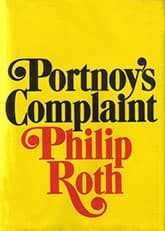Portnoy's Complaint
Critique • Quotes
 First edition
First editionFirst publication
1969
Literary form
Novel
Genres
Literary
Writing language
English
Author's country
United States
Length
Approx. 80,000 words
The great American jerk-off
It was one of the naughtier books—but not the naughtiest—in a long line of books that scandalized some and enticed many more in the late 1960s and early 1970s. Even if you never read Portnoy's Complaint then, you'd heard the novel dealt with masturbation. Lots of people assumed a compulsion to masturbate was the protagonist's "complaint".
How many of those early readers and non-readers would be shocked to discover that far from fading from fashion after being replaced on the bestselling lists by scandalous successors, Portnoy's Complaint has lasted more than five decades and counting? In fact, today it's practically considered an American modern classic. Plus, it's earned a seemingly permanent place in the admittedly low-brow culture with references popping up all over.
This couldn't be just because it's about sex. There's been a lot raunchier and more explicit stuff available since 1969.
But Philip Roth is a serious literary writer and Portnoy's Complaint is serious literature. Which, as any longtime, serious reader of literature should know, does not preclude it also being tremendously entertaining.
Jumping around
Roth prefaces the novel with a faux definition of "Portnoy's Complaint", as though it were a medical disorder "in which strongly-felt ethical and altruistic impulses are perpetually warring with extreme sexual longing, often of a perverse nature" including exhibitionism, fetishism, auto erotica, and so on, leading to feelings of shame. It is hypothesized that the condition arises from the mother-child relationship.
So you see it's about more than masturbation—though the sin of Onan was probably considered perverse by many back then. And, to be fair, there is one particularly disgusting incident involving jerking off in the novel.
But it's also about more than sex, perverse or otherwise. It's professedly about the morality of sex.
The story is framed as a psychoanalytical examination of the "lust-ridden" Alexander Portnoy, delivered as though he were on the doctor's couch. This allows Roth to jump around in time to look at different periods in Portnoy's life.
This perspective also lets him jump around stylewise—as it's delivered in a monologue by Portnoy, rambling from from confessional to stream of consciousness to political diatribes to stand-up comedian-style rants. This is one of Roth's liveliest and most innovatively written works. And one with the most sustained point of view.
Comic rant
Portnoy's Complaint is one of Roth's most angry books too. There's a level of anger running beneath it all, often boiling over. Anger at the repression of sexuality. Anger at the feelings of shame and degradation one is made to feel after giving in to sexual urges.
And Portnoy's anger at his upbringing. The character is obsessed by his Jewish mother—"addicted" to her, he says—and rails against her and his family, as well as the whole kit and kaboodle of social, political and religious held by the Jewish-American community.
But like a great comedian, Roth makes you feel the anger while also being entertained by it. The novel even ends with what is headlined a "PUNCH LINE" and which might make you question what exactly you have been reading all this time.
Whatever you think of Roth's views—I mean, Portnoy's views—in this novel (and I doubt anyone on earth is going to agree with everything he rages about), you have to appreciate the accomplishment here. A comic rant disguised as a literary work.
— Eric
Critique • Quotes

